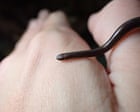
In a delightful convergence of hope and human effort, two significant developments are making waves in the realms of conservation and community accessibility. Each story, distinct in its context, shares a common theme of reopening possibilities in our natural world and daily lives.
In the serene grounds of Barbados, a small yet profound discovery has unfolded. The elusive Barbados threadsnake, considered by many to be the world’s tiniest serpent, has been rediscovered. Conservationists, who feared that this 10-centimeter creature—a slender strand akin to a noodle—had disappeared from existence, are now breathing a collective sigh of relief. Found quietly residing under a rock in Barbados’s central region, the snake’s presence was confirmed during an ecological survey led by the environment ministry along with Re:wild, a dedicated conservation organization.
This rare rediscovery not only offers hope for the tiny species’ resilience but also highlights the delicate interbalance of ecosystems. The revival of the threadsnake population underscores the importance of conservation efforts and ecological surveys, serving as a testament to the intricate wonders that still await discovery in nature’s folds. As it slithers back into the forefront of the ecological scene, it invites a renewed curiosity and dedication to preserving the lesser-known inhabitants of our diverse planet.
Meanwhile, across the Atlantic, an inspiring initiative in Great Britain is fostering inclusivity and enhancing everyday experiences with nature. A project driven by the campaign group Slow Ways has culminated in the mapping of 10,000 walking routes. This remarkable undertaking seeks to redefine accessibility, making engaging, scenic routes more attainable for individuals who face various mobility challenges. These carefully selected walks are designed to accommodate disabled individuals, parents maneuvering strollers, and older adults, ensuring that they too can enjoy the beauty of the countryside.
Slow Ways has developed an app that facilitates the simple navigation of these routes, a digital companion that endeavors to provide guidance and encouragement to those exploring the rugged beauty of rural Great Britain. Volunteers, integral to this initiative, diligently contributed to creating a network that not only connects paths and pathways but also people. Their work celebrates the joy of walking, unconfined and impactful, fostering a sense of community among its users.
Both these narratives—the snake’s rediscovery in Barbados and the enhancement of pathways in Great Britain—illustrate meaningful strides in bridging the gap between humans and nature. Each highlights a gentle reminder of our shared responsibility to protect the natural world while nurturing an inclusive environment accessible to all.
Amidst these stories lies a reflection of how conservation, technology, and community action can align harmoniously, offering hope and pathways to a future where both microscopic and grand-scale changes can coexist. As we continue to unearth these small marvels and carve out inclusive routes, we are reminded of the quiet strength found in persistence and collaboration.
Source: {link}
